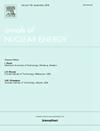CVEC: A customized VIS-based equivalence checker for verifying commercial field-programmable gate array synthesis software in small modular reactors
IF 1.9
3区 工程技术
Q1 NUCLEAR SCIENCE & TECHNOLOGY
引用次数: 0
Abstract
Field-programmable gate array (FPGA) is a hardware-based platform widely used in safety-related systems. FPGA development involves synthesis, placement and routing, with designs ultimately downloaded onto the device. Commercial FPGA synthesis software converts register-transfer level (RTL) designs into gate-level representations. Standards such as NUREG/CR-6421, IEEE Std 7-4.3.2, EPRI NP-5652, and EPRI TR-106439 require verification of these tools, while IEC 62566 mandates static analysis, including equivalence checking, for nuclear power plant applications. This paper introduces CVEC, a customized VIS-based equivalence checker that verifies the correctness of FPGA synthesis software. It performs equivalence checking between RTL designs and gate-level designs synthesized using Synopsys Synplify Pro within the Libero IDE. When verification is successful, it ensures that these softwares operate correctly at the synthesis level. Two case studies demonstrate the effectiveness of CVEC in verifying the functional correctness of commercial FPGA synthesis softwares.
CVEC:一个定制的基于vis的等效检查器,用于在小型模块化反应器中验证商业现场可编程门阵列合成软件
现场可编程门阵列(FPGA)是一种广泛应用于安全系统的硬件平台。FPGA开发涉及合成、放置和路由,设计最终下载到设备上。商用FPGA合成软件将寄存器传输级(RTL)设计转换为门级表示。NUREG/CR-6421, IEEE Std 7-4.3.2, EPRI NP-5652和EPRI TR-106439等标准要求对这些工具进行验证,而IEC 62566要求对核电站应用进行静态分析,包括等效性检查。本文介绍了一种定制的基于vis的等价性校验器CVEC,用于验证FPGA合成软件的正确性。它在RTL设计和使用Libero IDE中的Synopsys Synplify Pro合成的门级设计之间执行等效检查。当验证成功时,它确保这些软件在合成级别上正确地运行。两个算例验证了CVEC在验证商用FPGA合成软件功能正确性方面的有效性。
本文章由计算机程序翻译,如有差异,请以英文原文为准。
求助全文
约1分钟内获得全文
求助全文
来源期刊

Annals of Nuclear Energy
工程技术-核科学技术
CiteScore
4.30
自引率
21.10%
发文量
632
审稿时长
7.3 months
期刊介绍:
Annals of Nuclear Energy provides an international medium for the communication of original research, ideas and developments in all areas of the field of nuclear energy science and technology. Its scope embraces nuclear fuel reserves, fuel cycles and cost, materials, processing, system and component technology (fission only), design and optimization, direct conversion of nuclear energy sources, environmental control, reactor physics, heat transfer and fluid dynamics, structural analysis, fuel management, future developments, nuclear fuel and safety, nuclear aerosol, neutron physics, computer technology (both software and hardware), risk assessment, radioactive waste disposal and reactor thermal hydraulics. Papers submitted to Annals need to demonstrate a clear link to nuclear power generation/nuclear engineering. Papers which deal with pure nuclear physics, pure health physics, imaging, or attenuation and shielding properties of concretes and various geological materials are not within the scope of the journal. Also, papers that deal with policy or economics are not within the scope of the journal.
 求助内容:
求助内容: 应助结果提醒方式:
应助结果提醒方式:


